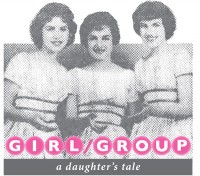New Play at LaMama in New York based on The Carmelettes, the 1950s All-Girl Doo-Wop Group from Jersey City

By Sally Deering

Â
Before the Shangri-Las and girl groups of the 60s, 70s, 80s, and beyond, there were girl doo- whop groups and one fondly remembered was The Carmelettes, a Jersey City trio of teen girls christened their girl-group name by their parish priest at Our Lady of Mt. Carmel. In 1959, the girls Angela LaPrete, Vicky Cevetello and Virginia Verga recorded two songs, “My Foolish Heart” and “Promise Me a Rose,”  and in 1960 “Aching for You” and “Something Tells Me I’m in Love.” They sang backup for Neil Sedaka’s hit “Oh Carol,” and Carole King’s hit “Oh Neil.” And when the group regrouped under the name “The Kittens,” (after Verga left for a solo career,) the LaPrete and Cevetello sang backup on several songs including the Top 40 hit “Itsy Bitsy Teenie Weenie Yellow Polka Dot Bikini” – which bombarded the airwaves during the summer of 1960. When the group disbanded in the 1961, the girls went on to start other careers and raise families. LaPrete married James Murphy (folks just know him as “Murphy”) and the couple raised their  daughter Susan, who went on to earn a BFA in Drama at New York University’s Tisch School of the Arts and become a singer in clubs and cabarets while performing in Off-Off Broadway plays. A drama teacher at Snyder High School, Susan Murphy continues to reinvent herself and her latest career turn is her new play, “Girl/Group: A Daughter’s Tale” a personal piece about her mother’s life as a doo-whop singer and the affect it has had on Murphy’s life. (“Girl/Group: A Daughter’s Tale” features Murphy along with Tom Cappadona, Drew Citron, Alison Scaramella, and Jenna Smith and is directed by Mario Giacalone. It opens at LaMama’s The Club in New York City on June 17 and runs through June 26.)
Â
“When I was 15, I started writing my own material,” Murphy says, “and somehow I knew I was going to come to this story at some point in my life.”
Murphy’s full-length play about her mother’s experience as a doo-whop singer began 20 years ago, she says, when she was invited to perform a 10-minute monologue on her story of choice and she chose to talk about her mother’s singing career. Ten years later, she started thinking of that monologue and the play began to take shape.
“I always had my mother’s records and they were always fascinating to me,” Murphy says. “It was family history and even more, it was my voice that I heard on those records. When I would research songs for the kind of music that I perform, I always came back around to my mother’s music and that’s when I decided that I needed to tell this story. And the more I worked on this play, the more I began to think about all the other uncelebrated people in this world. We live in an ‘American Idol’ society and there are people sitting behind desks, teaching school, who have amazing gifts and you just don’t know about them. That’s become very interesting to me.”
Growing up, Murphy wanted to be a rock star, she says. And because of her experience as an undergrad in the experimental theater division of NYU’S Tisch School of the Arts, Murphy’s career path turned into a search for belonging that included singing in New York’s cabaret rooms like the Eighty Eights and doing theater and music gigs that didn’t fit one particular genre.
“I was never a cabaret performer, per se,” Murphy says. “I would sing in cabarets and end up doing a U2 song. Then I would sing Standards in rock clubs. My tastes were eclectic.”
During all that time, Murphy says, the stories of her mother’s life as a doo-whop singer would always come back to her. Even though the play is called “Girl/Group…” her mother’s trio, The Carmelettes was really a pre-girl group. pre-Supremes, pre-Shirelles and pre-Shangri-Las.
In the mid-1950s, The Carmelettes received their name from their parish priest at Our Lady of Mt. Carmel church where they sang in the choir. They signed with Alpine, a subsidiary of Epic Records and recorded their first songs. That’s when Neil Sedaka chose them to sing back up for his song “Oh Carol,” a tune he wrote about singer/songwriter Carole King. Â Although not much is written about The Carmelettes, according to Angela LaPrete Murphy, “We sang backup on ‘Oh Carol’ and then were asked to duplicate the sound on ‘Oh, Neil.’ At that time, Virginia had already left the group. Vicky and I did a great deal of backup with Carole King for other artists.”
Beatrice Verdi, Virginia Verga’s sister wrote songs for them, arranged the vocals, and went on to become a successful songwriter, Susan Murphy says: “She was unbelievable. She was writing four-chord doo-wop stuff, the harmonies were insane and these little girls did them. One of their records is now up on eBay for 50 bucks.”
The Carmelettes continued to do back up and record their own songs. When they recorded “Promise Me a Rose” at Columbia Studios in New York, singer Anita Bryant recorded the same song and the DJ pulled The Carmelettes version off the air. Similar to most girl groups like the Shangri-Las, The Carmelettes/Kittens disbanded and moved on with their lives.
“It’s because of The Carmelettes that I discovered a personal love for all types of music,” Murphy says, “and a deep respect for the path my mother paved all those years ago so that other girl groups could follow.”
And although her career as a doo-whop singer became a treasure trove of memories in a box of 45s, Angela LaPrete Murphy made sure the music never stopped playing in the Murphy household.
“I always knew doo-wop because it was always playing in our house,” Murphy says. “And my mother always sang. In fact, everybody always sang in my house. Even though we weren’t music professionals – except for my mom – we would bust out in songs.”
Girl/Group: A Daughter’s Tale
June 17-26,
Fri & Sat 10 pm; Sun 5:30 pm
Tickets $18
LaMama’s The Club
74A East 4th Street
(Btw Bowery & 2nd Ave)
New York City
212-475-7710
Tickets can be purchased online at www.lamama.org/theclub
Â
To view a short video about the show on YouTube, go to: http://www.youtube.com/watch?v=WJfqW2Toh9A
Â
Â
Â
Â
          Â
Â
